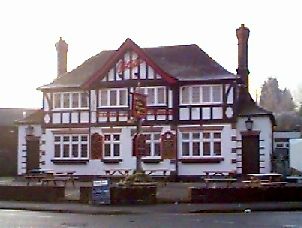Friday 3rd of May 2024
Friday 3rd of May 2024

Known locally for generations as 'the Fly', this is Kegworth's oldest recorded pub and before 1796 it was called the Black Swan 1. It was a traditional English coaching inn being in a prime location on what was then the through road from London to Derby; Derby Road did not exist and the original Flying Horse Hotel stood on the left-hand side of High Street looking from the Church. The Hotel abutted the building that houses the 'Treasure Chest' today; It was damaged by fire in the 1920s and demolished in 1929. From 1796 until at least 1846 the Fly was run by various members of the Barrow family.
It was the stopping place for many of the thirty horse drawn coaches per day that ran through Kegworth. From as early as 1831 the office for the local Revenue Officer was located here. His presence in the village was necessary because of the existence of the local breweries. By 1848, as well as being licensee, Mrs Sarah Barrow was running the village Post Office from the premises and a mail coach left for Derby at 6-00p.m. pm daily from Monday to Friday.
The 1870 Harrods Directory of Leicestershire listing reflects the social changes brought about by the Midland Railway, describing the Flying Horse as a commercial hotel. John Portch was landlord and offered 'every comfort for commercial gentlemen & others, lock up coach house, loose boxes for hunters, wines & spirits of the best quality.
Wright's 1896 Directory of Leicestershire describes the Flying Horse as 'Ye Olde Flying Horse, good accommodation for travellers, cyclists, fishing and boating parties'. This description confirms the pub's central location in the village and a desire of the landlord, WIlliam Boam, to exploit a new market. This was created by people from towns with new found leisure time on their hands, which enabled them to visit country locations like Kegworth to pursue new and popular pastimes of cycling, boating or fishing.
For many years public auctions of property were held at the Flying Horse. 56 Derby Road was sold at auction there in 1843, as was Stockton House, High Street in 1920.
Following demolition of the old coaching inn, Worthington Brewery did attempt to open the new Flying Horse on the opposite side of the road but were thwarted by the Licensing Justices who refused to grant a licence.
So to make way for the new 'Olde Flying Horse Hotel' the cottage in which Sir John Kirk was born in 1847 was demolished along with several others. The pub was opened on its present site about 1930, with Thomas Southern, from Chesterfield, as the licensee. He, then his wife Mary, and finally his son-in-law; Tony Davis, were to hold the licence until the 1960s.
The new property followed the trend of the time, built in the mock Tudor style with two separate bars and a dining/function room. The public bar was for the working man and the lounge for those who thought themselves a little better: During World War II the lounge is reported to have resembled an officers' mess, maintaining the social and class distinctions of the time. In the late 1960s Bass Brewery created one egalitarian bar from the two rooms. However, whilst distinct social class may be a thing of the past there is still an invisible divide in the one room, with generally the drinking men in the old bar area and couples using what was the lounge.
1 I have just read a newspaper article from the Derby Mercury 2 Sep 1790 saying there was an auction being held at the Flying Horse Inn in Kegworth. Therefore your reference to it being called the Black Swan before 1796 is incorrect. - John Tarratt